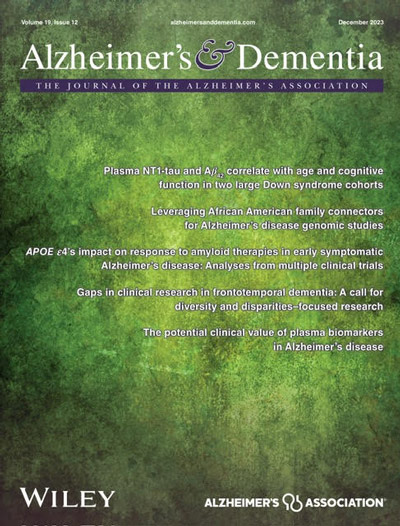Serum brain‐derived neurotrophic factor and progression to MCI in cognitively normal older adults
IF 13
1区 医学
Q1 CLINICAL NEUROLOGY
引用次数: 0
Abstract
BackgroundBrain derived neurotropic factor (BDNF) has been associated with improved neuronal survival and synaptic plasticity and long‐term memory. Some human studies also reported the relationship between lower blood BDNF levels and poorer memory function and dementia. A prior longitudinal study also demonstrated higher serum BDNF levels were associated with lower risk of overall dementia and Alzheimer’s disease (AD) dementia. However, it remains uncertain whether reduced serum BDNF levels precede the onset of mild cognitive impairment (MCI), which is known as pre‐dementia stage. This study aimed to examine whether higher serum BDNF in cognitively normal (CN) older adults is related to less common progression to MCI and to identify potential moderators of this relationship.MethodA total of 278 CN older adults between 55 and 90 years of age were enrolled. All participants underwent comprehensive clinical assessments, serum BDNF level measurement, and multimodal brain imaging including Pittsburgh compound B (PIB)‐positron emission tomography (PET) at baseline, and followed up for up to 4 years. Serum BDNF levels were divided into two categories by median value of serum BDNF level: < 21448.5 pg/mL (low BDNF), and > 21448.5 pg/mL (high BDNF). Cox model was used to analyze the relationship between baseline BDNF levels and the risk for MCI progression controlling for potential confounders. We also ran sensitivity analyses stratified by sex, age, education, apolipoprotein E ε4 (APOE4) positivity, and amyloid PET positivity.ResultDuring follow‐up, 24 participants developed MCI. Controlling for age, sex, education and APOE4 positivity, low BDNF group had significantly more frequent progression to MCI than high BDNF group (hazard ratio for MCI, 2.98; 95% CI, 1.17‐7.56; p=0.02) and these association persisted even after controlling for amyloid PET positivity and vascular risk factor score as additional covariates (hazard ratio, 2.98; 95% CI, 1.17‐7.55; p=0.02). Sensitivity analyses revealed that the associations were apparent only among women, participants aged younger than 75 years, those without college degrees, and amyloid negative participants (Table).ConclusionHigher serum BDNF levels may protect against future occurrence of MCI in cognitively healthy older adults. Such influence appears more prominent in women and younger, less educated, or amyloid PET negative individuals.求助全文
约1分钟内获得全文
求助全文
来源期刊

Alzheimer's & Dementia
医学-临床神经学
CiteScore
14.50
自引率
5.00%
发文量
299
审稿时长
3 months
期刊介绍:
Alzheimer's & Dementia is a peer-reviewed journal that aims to bridge knowledge gaps in dementia research by covering the entire spectrum, from basic science to clinical trials to social and behavioral investigations. It provides a platform for rapid communication of new findings and ideas, optimal translation of research into practical applications, increasing knowledge across diverse disciplines for early detection, diagnosis, and intervention, and identifying promising new research directions. In July 2008, Alzheimer's & Dementia was accepted for indexing by MEDLINE, recognizing its scientific merit and contribution to Alzheimer's research.
 求助内容:
求助内容: 应助结果提醒方式:
应助结果提醒方式:


